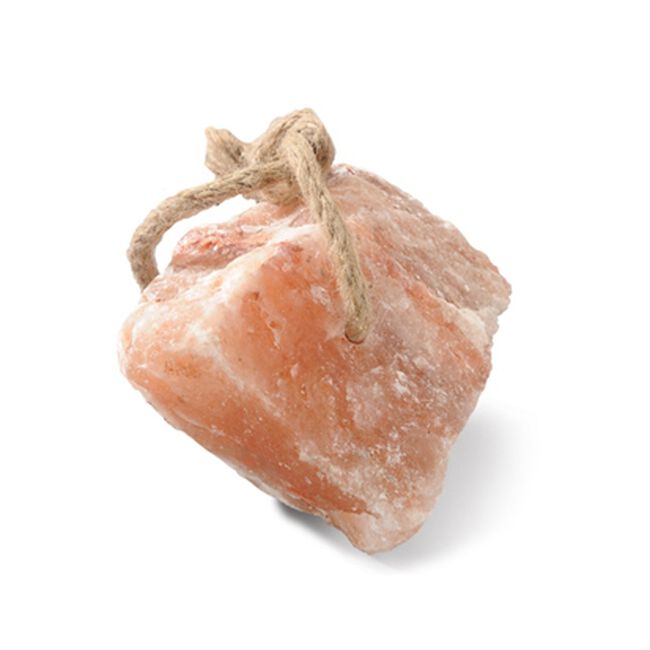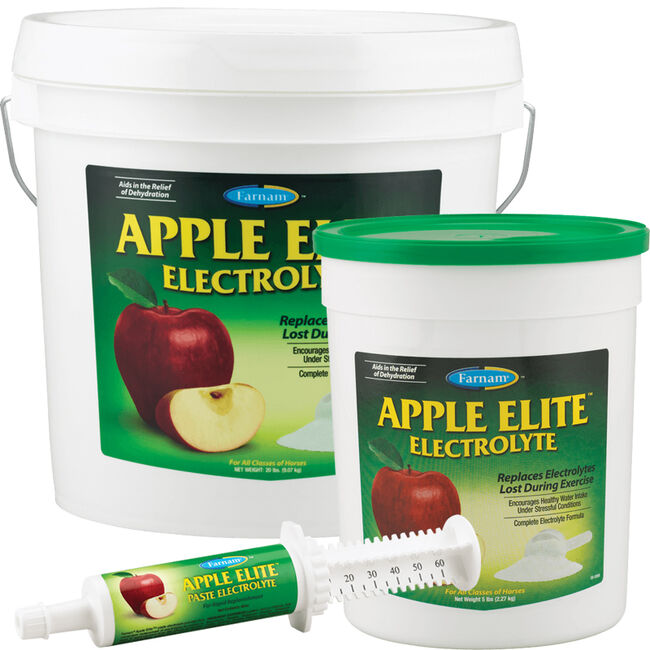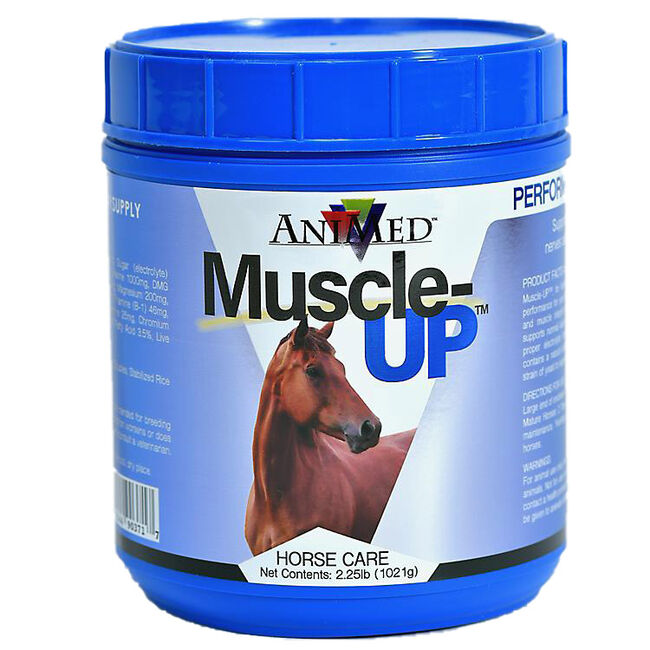
In hot and humid conditions, your horse may require a bit of extra care. From the cooling breeze of fans and cold hosing to additional oral supplementation, there are a number of ways that we can support our horses, whatever the weather may be.
Due to the abundance of supplements on the market, it can be confusing to determine exactly what your horse needs. In this blog, we break down the common supplements that should be fed in hot weather, and explain exactly when they should be fed. We hope to demystify salt, electrolytes, and amino acids so that you can be confident feeding them to your horses for the proper situations.
Salt
All horses should be supplemented with salt on a daily basis. Salt is an essential mineral that horses cannot produce themselves. Additionally, it is not readily available in forage, so it is imperative that horses have continuous access to salt. Horses are extremely adept at managing their salt intake; in most cases, simply providing your horse with salt will ensure that they meet their sodium needs.
According to Jessica Drexler, of Triple Crown Feed, “Sodium helps tissues and organs, like the large intestine, retain water. Water in the gut is essential for proper fermentation and movement of feedstuffs through the digestive tract. Sodium works with the brain to trigger “thirst” in the horse when more hydration is needed. It also helps move glucose across the cell membrane where it is used as a fuel source. If sodium levels are insufficient, a horse can show signs of early fatigue, muscle weaknesses, and impaired performance.”
Generally speaking, horses need 1-2 ounces of salt each day to reach their sodium requirements. However, if your horse is sweating profusely, as in exceptionally hot weather, or is involved in strenuous exercise, they may need as much as 4-6 ounces of salt per day.
Salt can be fed to your horse in a variety of ways. Loose salt, such as ABC Redmond Salt and Redmond Agriculture #10 Fine Premium Mineral Salt, can be mixed with your horse’s grain or fed on a free-choice basis. Many horses benefit from feeding approximately one ounce of salt (1.66 tablespoons) directly into their feed and then allowing access to additional salt as needed.
Salt blocks are another wonderful way to supplement your horse’s salt intake. They allow your horse to self-regulate their sodium levels. Himalayan Horse Rock Salt Licks and Himalayan Salt Bricks have become popular, mainly because this pure form of salt also contains important trace minerals such as potassium and magnesium. Many experts encourage using salt blocks in conjunction with loose salt, because continuous licking of the block may cause your horse’s tongue to become sore.
Himalayan Horse Rock Salt
This salt lick contains salt, as well as all the natural minerals your horse needs for a balanced intake of iron, potassium, and magnesium.
Just as in humans, salt drastically increases your horse’s thirst. Therefore, whenever you feed your horse salt, in any form, it is imperative that you provide your horse with plenty of clean, fresh water.
Electrolytes
Electrolytes are salts and minerals needed for biological processes requiring electrical currents and sending electrical impulses to other cells; such as water balance, a steady heartbeat, nerve function, and muscle contraction. When electrolytes are dissolved in water, they conduct electricity, allowing these essential functions to occur. If your horse does not have an adequate amount of electrolytes in their system, it can wreak havoc on their health. Symptoms of an electrolyte imbalance include dehydration, cramps, an irregular heartbeat, diarrhea, and loss of muscle control. Humans, just like our horses, need electrolytes, which we can get from a variety of sources, from fruits and vegetables to sports drinks!
Unlike salt, electrolytes do not need to be fed on a daily basis. “Free choice salt and added minerals to a diet are daily necessities, but electrolytes are something you use when the animal is dehydrated or it is hot out,” explains Morgan Monty, the Assistant Manager of Pet Sales at The Cheshire Horse. “They also can be used when they sweat excessively or have an unusually stressful workout.”
“Horses working heavily for extended periods of time in hot conditions or horses living in hot and humid conditions may need electrolytes, a combination of sodium, chloride, potassium, magnesium, and calcium (and sometimes sugars) to help to replenish essential nutrients lost when the horse is sweating,” Jessica Drexler, of Triple Crown Feed, says.
There are a number of different electrolyte products available on the market. Oral pastes, such as Finish Line Electrocharge and Farnam Apple Elite Electrolyte, are formulated to rapidly replenish the nutrients that a horse loses when sweating or exercising. This makes them popular for high-performance horses in hot weather as well as senior horses who may have trouble managing the heat.
Farnam Apple Elite Electrolyte
This electrolyte is a longtime customer favorite for a reason! It’s a complete electrolyte formula that’s apple flavored for easy feeding, and available in a 5 lb or 20 lb tub, as well as a 60 cc syringe.
Meanwhile, powdered electrolytes, like Manna Pro Bounce Back Multi-Species Electrolyte Supplement and Neogen Stress-Dex Oral Electrolytes, can be mixed with your horse’s grain rations or even dissolved into your horse’s water to encourage them to drink (If you choose to mix it into the water, be sure that you provide a bucket of plain water as well). This makes powered electrolytes extremely convenient after a ride or to support your horse throughout a heatwave.
“Be aware that not all electrolytes are salt-based and some actually contain glucose (sugar) as the main ingredient, which can reduce the electrolyte content of the product,” Jessica continues. “By providing a quality electrolyte for your hardworking performance horse, you can replace critical nutrients that help with muscle function and recovery and help improve heat tolerance that comes with exercise, as well as physical temperatures.” Quick Note: If your horse is diagnosed with Cushing’s or Insulin Resistance (IR), you will want to speak with your veterinarian to determine the best low-sugar electrolyte solution for your horse.
Amino Acids
Horses need amino acids, which are essential protein components for hoof growth, muscle development and recovery, hair coat, reproduction, general well-being, and so much more. Known as the building blocks of proteins, amino acids are highly effective when used after strenuous activity. The amino acids which horses need as a part of their diet are lysine, methionine, threonine, tryptophan, isoleucine, valine, histidine, leucine, phenylalanine, and arginine.
“Amino acids are recommended to use in conjunction with the electrolytes in such situations to replenish the muscles with much-needed proteins,” Morgan says. Products like Uckele Daily Performance Pellet, Animed Muscle-Up Powder, and the Equinety Horse Amino Acids support the recovery of the muscular system, especially after exercise; they have been shown to also be effective in building a horse’s muscular strength and endurance while minimizing the chances of a horse tying up. The amino acids facilitate muscle development, while also strengthening your horse’s immune system, nervous system, and circulatory system. Many equestrian professionals utilize amino acid supplements throughout their training programs to keep their horses performing at the highest levels.
AniMed Muscle-UP Powder
This fast-absorbing supplement is designed to support the equine athlete’s overall health and the function of the muscular system. It supports proper electrolyte balance and normal lactic acid levels in the horse’s body.
It is important to look for supplements that have a balanced amino acid profile. “The closer dietary amino acid levels are to what is considered an ideal amino acid balance, the more efficiently the horse will utilize those amino acids for protein synthesis and metabolism in the body,” Dr. Bill Vandergrift of Triple Crown Horse Feed explains. “When amino acids are not properly balanced, excess levels of individual amino acids will be utilized by the body as an energy source rather than a protein source. The process of converting amino acids into energy is an inefficient process that generates heat and forces the horse to excrete greater amounts of water and electrolytes compared to a horse receiving a more balanced supply of amino acids.”
Many horses can benefit from amino acid supplementation. Most commercial grains provide adequate amounts of amino acids for daily maintenance, however, if your horse is in a heavy workload or does not receive a full ration of grain, they are a candidate for an amino acid supplement. Additionally, horses who have a difficult time building muscle often benefit from these supplements. Amino acids can be fed on a daily basis or can be fed when you feel like your horse needs additional support (like after a horse show, an exceptionally hard workout, or if they have over-exerted themselves).
With a bit of smart supplementation, your horse can thrive in hot and humid conditions. By incorporating salt, electrolytes, and amino acids into your horses’ diets, you are giving them the proper nutrition to handle whatever the weather can throw at them.

Do you have questions about what supplements your horse needs? Our experienced and highly trained sales staff is always available to help you select the best equine supplements and assist you in making your purchase. Contact us today to set up an appointment for a complimentary nutrition consultation.



